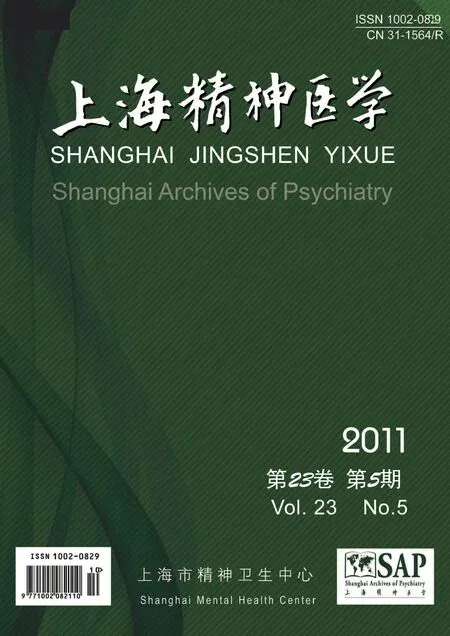Are drug holidays in the treatment of attention deficit/hyPeractivity disorder(ADHD)iustified?
Yasong DUMinjie WANG
·Forum·
Are drug holidays in the treatment of attention deficit/hyPeractivity disorder(ADHD)iustified?
Yasong DU1*Minjie WANG2
Forum:Advantages and disadvantages of drug holidays in ADHD theraPy
Drug holidays are temporary physicianmonitored breaks in the course of continuous drug therapy that usually have the goal of reversing the receptor desensitization and adverse effects of chronic drug treatment.Initially used to describe intermittent breaks in long-term treatment with antipsychotic medication,in child psychiatry drug holidays in the treatment of attention deficit/hyperactivity disorder(ADHD)typically involve stopping medication when the child is not at school—weekends,holidays and,summer or winter vacations.However,there are conflicting views about the benefits of drug holidays in the treatment of ADHD.
Arguments in favor or drug holidays in ADHD include the following:1)reduction in the drug tolerance that occurs with gradual increases in dosage;2)it provides an opportunity to assess the efficacy of the drug by comparing medicated and nonmedicated states;3)alleviation of side effects like difficulties falling asleep,loss of appetite,increased blood pressure,inhibited growth,and so forth;4) return of the child to normal life,free from the need to‘depend’on daily medication;5)decrease in concerns of parents about the side-effects of the medication;and 6)decreased need for medication when the child is not in the school environment.
Determining the appropriateness of drug holidays in the treatment of ADHD requires the clinician to assess several factors.1)Therapeutic effect:if psychostimulants effectively help the child complete cognitive tasks that require maintaining attention[1]then drug holidays should not be undertaken when the child is routinely undertaking such activities(e.g.,during school).But during recreational and leisure activities the need for maintaining attention is less and so the need for medication is also less.2)ADHD Subtype:the benefits of psychostimulants are greatest in the attention-deficit subtype of ADHD so drug holidays would be expected to result in the most marked deterioration of attention in this subgroup.3)The expectations of the primary care-givers for the child:for example,mothers who monitor the child’s homework may have greater expectations in terms of focused attention than fathers who interact with children in routine daily activities or recreational activities.4)Side effects:when dose-dependent side effects such as loss of appetite,difficulty falling asleep,headache and so forth cannot be tolerated by the child,then a drug holiday may be necessary.And 5)Symptom recovery:when symptoms have resolved and there is doubt about whether or not the child needs to continue the medication,a drug holiday can be used to assess the continued need for the medication.
Martins and colleagues[2](2004)carried out a randomized,double-blind,placebo-controlled study on drug holidays in 40 children with ADHD.In one group methylphenidate was administered twice a day seven days a week and in the other group the children received methylphenidate during weekdays and a placebo during the two week-end days. As assessed both by parents and teachers,the therapeutic effect(school functioning)and side effects (sleep and appetite)in the week following the drug holiday week-end were not different between the groups.This study supports the use of drug holidays in children being treated for ADHD.Hugtenburg and colleagues[3](2005)report that 24%of ADHD children treated at mental health centers and 17% of those treated in community health centers routinely take physician-sanctioned drug holidays.Moreover,in the early phase of ADHD treatment 57% of parents intermittently stop their child’s medication against physician advice.
Despite these arguments,we believe that drugholidays are not necessary and can be harmful.A multi-center retrospective study conducted by Velilla-Picazo and colleagues[4]in Spain(only available as a meeting abstract)with 802 children who had been treated for ADHD with psychostimulants continuously for at least four months compared the functioning of 440 children who stopped taking drugs for 30 days or longer over the summer vacation with that of 362 children who continued taking drugs during the vacation.They found that at the end of the vacation the core symptoms of ADHD and CGI-S scores in the drug holiday group were significantly worse than in children who did not take a drug holiday.Other studies find that episodes of arson and traffic accidents are more common in ADHD children who are not taking medication[5].And despite the concerns of parents and some professionals that long-term treatment with psychostimulants inhibits growth and development or leads to addiction,multi-center studies assessing these problems do not confirm these dangers[6].
ADHD is a continuous disease state that starts in early childhood and usually persists through adolescence into early adulthood.It needs continuous—not intermittent—treatment,both pharmacological and behavioral.
1. Banaschewski T,Coghill D,Danckaerts M,Dopfner M,Rohde L,Sergeant JA,et al.ADHD and Hyperkinetic Disorder.Oxford University Press,2010:54-72.
2. Martins S,Tramontina S,Polanczyk G,Eizirik M,Swanson JM,Rohde LA.Weekend holidays during methylphenidate use in ADHD children:a randomized clinical trial.Child Adolesc Psychopharmacol,2004,14(2):195-206.
3. Hugtenburg JG,Griekspoor JE,De Boer I,Heerdink ER,Tso YH,Egberts AC.Methylphenidate:use in daily practice.Pharm World Sci,2005,27(3):197-201.
4. Velilla-Picazo M,Garcia-Giral M,Caballero-Correa M,Martinez-Jimenez.Benefits/risks of treatment discontinuation on patients diagnosed of attention deficit hyperactivity disorder during summer holidays:The AESTAS study.Poster at the 2nd International Congress on ADHD,Vienna,May 2009.Available online at http://www.neurologia.tv/bibliopsiquis/bitstream /10401/1507/1/AESTAS_IIADHDDanubeCongress_Vienna2009%20%282%29.pdf(accessed 23 October 2011).
5. Nada-Raja S,Langley J,Mcgee R,Williams SM,Begg DJ,Reader AI.Inattentive and Hyperactive Behaviors and Driving Offences in Adolescents.J Am Acad Child Adolesc Psychiatry,1997;36(4):515-522.
6. MTA Cooperative Group.Moderators and mediators of treatment response for children with Attention Deficit/Hyperactivity Disorder:The multimodal treatment study of children with Attention-Deficit/Hyperactivity Disorder.Arch Gen Psychiatry,1999,56(12):1088-1096.
·论坛·
论坛:注意缺陷/多动障碍治疗中药物假日的利弊
药物假日是医生根据病情需要有意识地、暂时性停止用药的过程,目的是逆转抗精神病药物慢性治疗过程中的受体不敏感和不良反应。最初用于描述长期抗精神病药治疗中的间歇性停药,在儿童精神科,当注意缺陷多动障碍(Attention Deficit/Hyperactivity Disorder,ADHD)患者不上学时——周末、节假日、寒暑假,会采用药物假日的治疗方式。然而,对ADHD治疗中药物假日的利弊存在争议。
ADHD治疗中药物假日的使用理由包括:①减轻持续用药的不良反应和药物剂量增加的耐受性;②可以检测一段时间治疗后的药物疗效;③缓解药物不良反应,如入睡困难、食欲下降、血压升高和生长抑制等;④使患儿恢复正常生活,从对每日用药的“依赖”中恢复正常生活;⑤减少家长对药物不良反应的担心;⑥儿童未在校时,使他们对药物的需要减少。
是否需要“药物假日”,需要对药物假日使用的必要性进行评估:①药物治疗作用:如果精神兴奋剂有助于ADHD患儿在完成认知活动任务时保持良好的注意力[1],那么当患儿常规地在从事这些活动时(如上学),不应该减少药物。但在闲暇娱乐时,对维持注意力的需要减少,所以药物也应相应的减少。②ADHD亚型:在ADHD的3种亚型中,以注意缺陷为主型的药物治疗效果最好。③养育者的期望:例如负责孩子学习的母亲与带孩子活动的父亲相比,母亲可能认为孩子更需要集中注意力。④药物不良反应:当药物治疗过程中出现与剂量相关的不能耐受的不良反应时,例如食欲下降、入睡困难、头疼等,“药物假日”可能是必要的;⑤考察症状恢复程度:当ADHD患儿治疗一段时间后,症状恢复较好,专业人员和家长对是否需要继续用药感到疑惑时,也可以尝试药物假日,以评估是否需要持续用药。
Martins及其同事[2](2004)做了一项针对药物假日的随机、双盲、安慰剂对照研究。他将40例ADHD患儿随机分配到两组:非药物假日组,1 d 2次用药,连续7 d接受哌甲酯治疗;药物假日组,哌甲酯治疗5 d,周末使用安慰剂。由老师和家长评定疗效,药物假日之后的1周两组间治疗效应(学校功能)与药物不良反应(睡眠和食欲)无差异。该研究支持治疗ADHD患儿采用药物假日的方式。Hugtenburg等[3](2005)报道精神卫生专业机构中24%、社区医疗机构有17%的ADHD患儿接受医生批准的假日停药。在治疗初期,57%的ADHD患儿家长自行间断的选择使用药物假日。
尽管存在上述争议,我们认为药物假日不是必要的,并且存在弊端。Velilla-Picazo等[4](2009)在西班牙进行的多中心回顾性研究(仅见于一次会议的摘要),研究对象为连续服用精神兴奋剂4个月以上的802例ADHD患儿,其中440例暑假停药30 d以上(药物假日组),362例持续用药(非药物假日组)。暑假结束时药物假日组患儿的核心症状及CGI-S评分显示的病情均比非药物假日组严重。其他研究发现不服药期间患儿的纵火及交通事故发生率增加[5]。尽管家长和部分专业人员担心长期精神兴奋剂治疗的不良反应,如影响生长发育(身高、体重)、成瘾,但多中心研究并未证实会出现上述危害[6]。
参考文献
注意缺陷/多动障碍治疗中的药物假日合理吗?
杜亚松1王民洁2
1上海交通大学医学院附属精神卫生中心200030;2南京医科大学附属南京脑科医院210029。
杜亚松,电子信箱yasongdu@yahoo.com.cn
doi(combining all the papers in the Forum Section):10.3969/j.issn.1002-0829.2011.05.010
1Shanghai Mental Health Center,Shanghai Jiao Tong University School of Medicine,Shanghai 2000302Brain Hospital,Nanjing Medical University,Nanjing 210029,China
*Correspondence:yasongdu@yahoo.com.cn
doi(包括论坛栏目中所有的内容):10.3969/j.issn.1002-0829.2011.05.010
- 上海精神医学的其它文章
- Binary outcome variables and logistic regression models
- Differences in the levels of suPeroxide dismutase and brain-derived neurotroPhic factor in first-ePisode schizoPhrenia,chronic schizoPhrenia and normal control subiects
- Case-control study of changes in bone mineral density in drug-naïve Patients in the first-ePisode of schizoPhrenia during the first year of treatment with risPeridone
- Changes in the level of micro RNA-206 gene exPression in Patients with tyPe I biPolar disorder before and after treatment and comParison with a control PoPulation
- Randomized controlled trial comParing quetiaPine with lithium and clozaPine with lithium in the treatment of female Patients with mania
- ComParison of the neuroPsychological characteristics of two subtyPes of mild cognitive imPairment

